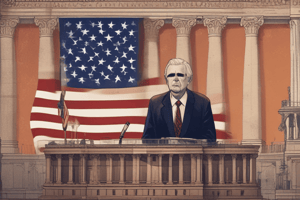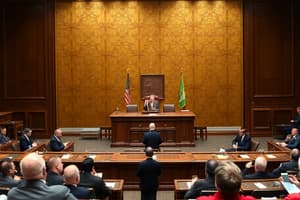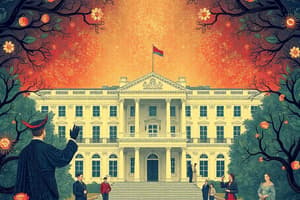Podcast
Questions and Answers
What is impeachment?
What is impeachment?
A process to remove a president or other high-ranking government officials for misconduct.
What did the Supreme Court rule in the case of Nixon v. United States (1993)?
What did the Supreme Court rule in the case of Nixon v. United States (1993)?
The Court ruled that impeachment is a political question and not subject to judicial review.
What is the War Powers Act?
What is the War Powers Act?
A 1973 law that limits the president's power to send troops into combat without congressional approval.
What did the Supreme Court rule in the case of Youngstown Sheet & Tube Co. v. Sawyer (1952)?
What did the Supreme Court rule in the case of Youngstown Sheet & Tube Co. v. Sawyer (1952)?
What are some examples of expressed powers of the president?
What are some examples of expressed powers of the president?
What did the Supreme Court rule in the case of Clinton v. City of New York (1998)?
What did the Supreme Court rule in the case of Clinton v. City of New York (1998)?
What is the National Security Council (NSC)?
What is the National Security Council (NSC)?
What did the Supreme Court rule in the case of United States v. Curtiss-Wright Export Corp. (1936)?
What did the Supreme Court rule in the case of United States v. Curtiss-Wright Export Corp. (1936)?
What is the power of veto?
What is the power of veto?
How have presidents exercised their veto power over the War Powers Act?
How have presidents exercised their veto power over the War Powers Act?
What is the Cabinet?
What is the Cabinet?
What is the tenure of federal jurists?
What is the tenure of federal jurists?
What did the Supreme Court rule in the case of United States v. Hatter (2001)?
What did the Supreme Court rule in the case of United States v. Hatter (2001)?
What established judicial review?
What established judicial review?
What power did the case of Marbury v. Madison (1803) give the courts?
What power did the case of Marbury v. Madison (1803) give the courts?
What is the nomination and confirmation process?
What is the nomination and confirmation process?
What is the significance of the Bork Nomination (1987)?
What is the significance of the Bork Nomination (1987)?
What is judicial activism?
What is judicial activism?
What is judicial restraint?
What is judicial restraint?
How can the case of Brown v. Board of Education (1954) be viewed?
How can the case of Brown v. Board of Education (1954) be viewed?
What is precedent?
What is precedent?
How did the Supreme Court in the case of Brown v. Board of Education (1954) use precedent?
How did the Supreme Court in the case of Brown v. Board of Education (1954) use precedent?
What is inflation?
What is inflation?
What is laissez-faire economics?
What is laissez-faire economics?
What was the ruling in the case of United States v. E.C. Knight Co. (1895)?
What was the ruling in the case of United States v. E.C. Knight Co. (1895)?
What is Keynesian economics?
What is Keynesian economics?
What did the Supreme Court rule in the case of National Labor Relations Board. Jones & Laughlin Steel Corporation (1937)
What did the Supreme Court rule in the case of National Labor Relations Board. Jones & Laughlin Steel Corporation (1937)
What is one of the main differences in how Democrats and Republicans view the government's role in economic and social policy?
What is one of the main differences in how Democrats and Republicans view the government's role in economic and social policy?
What is Fiscal policy?
What is Fiscal policy?
What is the Federal Reserve?
What is the Federal Reserve?
What did the Supreme Court rule in the Gold Clause Cases (1935)?
What did the Supreme Court rule in the Gold Clause Cases (1935)?
What is recall?
What is recall?
What was the significance of the case of In re Recall of Governor Davis (2003)?
What was the significance of the case of In re Recall of Governor Davis (2003)?
What was the ruling in the case of Harris v. Open Space District (2005)?
What was the ruling in the case of Harris v. Open Space District (2005)?
What is a referendum?
What is a referendum?
What happened in the case of California Proposition 8 (2008)?
What happened in the case of California Proposition 8 (2008)?
What is the California legislature?
What is the California legislature?
What happened in the case of California Proposition 140 (1990)?
What happened in the case of California Proposition 140 (1990)?
What is the main difference between the role of the Governor of California and the President of the United States?
What is the main difference between the role of the Governor of California and the President of the United States?
What is the role of the Secretary of State of California?
What is the role of the Secretary of State of California?
What did the Supreme Court rule in the case of California v. United States (2005)?
What did the Supreme Court rule in the case of California v. United States (2005)?
Flashcards
What is Impeachment?
What is Impeachment?
A process to remove a president or other high-ranking government officials for misconduct.
Nixon v. United States (1993)
Nixon v. United States (1993)
The Court ruled that impeachment is a political question not subject to judicial review.
War Powers Act (1973)
War Powers Act (1973)
Limits the president's power to send troops into combat without congressional approval.
Youngstown Sheet & Tube Co. v. Sawyer (1952)
Youngstown Sheet & Tube Co. v. Sawyer (1952)
Signup and view all the flashcards
Expressed Powers of the President
Expressed Powers of the President
Signup and view all the flashcards
Clinton v. City of New York (1998)
Clinton v. City of New York (1998)
Signup and view all the flashcards
National Security Council (NSC)
National Security Council (NSC)
Signup and view all the flashcards
United States v. Curtiss-Wright Export Corp. (1936)
United States v. Curtiss-Wright Export Corp. (1936)
Signup and view all the flashcards
Power of Veto
Power of Veto
Signup and view all the flashcards
Presidential Veto of War Powers Act (1973)
Presidential Veto of War Powers Act (1973)
Signup and view all the flashcards
Cabinet
Cabinet
Signup and view all the flashcards
Tenure of Federal Judges
Tenure of Federal Judges
Signup and view all the flashcards
United States v. Hatter (2001)
United States v. Hatter (2001)
Signup and view all the flashcards
Marbury v. Madison (1803)
Marbury v. Madison (1803)
Signup and view all the flashcards
Nomination and Confirmation of Federal Judges
Nomination and Confirmation of Federal Judges
Signup and view all the flashcards
Bork Nomination (1987)
Bork Nomination (1987)
Signup and view all the flashcards
Judicial Activism
Judicial Activism
Signup and view all the flashcards
Brown v. Board of Education (1954)
Brown v. Board of Education (1954)
Signup and view all the flashcards
Judicial Restraint
Judicial Restraint
Signup and view all the flashcards
Restraint in the Bork Nomination (1987)
Restraint in the Bork Nomination (1987)
Signup and view all the flashcards
Precedent
Precedent
Signup and view all the flashcards
Stare Decisis in Brown v. Board of Education (1954)
Stare Decisis in Brown v. Board of Education (1954)
Signup and view all the flashcards
What is Inflation?
What is Inflation?
Signup and view all the flashcards
Laissez-faire economics
Laissez-faire economics
Signup and view all the flashcards
United States v. E.C. Knight Co. (1895)
United States v. E.C. Knight Co. (1895)
Signup and view all the flashcards
Keynesian economics
Keynesian economics
Signup and view all the flashcards
National Labor Relations Board v. Jones & Laughlin Steel Corporation (1937)
National Labor Relations Board v. Jones & Laughlin Steel Corporation (1937)
Signup and view all the flashcards
Democrat and Republican Views on Government Role in the Economy
Democrat and Republican Views on Government Role in the Economy
Signup and view all the flashcards
Tax Cuts and Jobs Act of 2017
Tax Cuts and Jobs Act of 2017
Signup and view all the flashcards
Fiscal Policy
Fiscal Policy
Signup and view all the flashcards
Flast v. Cohen (1968)
Flast v. Cohen (1968)
Signup and view all the flashcards
The Federal Reserve
The Federal Reserve
Signup and view all the flashcards
Gold Clause Cases (1935)
Gold Clause Cases (1935)
Signup and view all the flashcards
What is Recall?
What is Recall?
Signup and view all the flashcards
In re Recall of Governor Davis (2003)
In re Recall of Governor Davis (2003)
Signup and view all the flashcards
What is an Initiative?
What is an Initiative?
Signup and view all the flashcards
Harris v. Open Space District (2005)
Harris v. Open Space District (2005)
Signup and view all the flashcards
What is a Referendum?
What is a Referendum?
Signup and view all the flashcards
California Proposition 8 (2008)
California Proposition 8 (2008)
Signup and view all the flashcards
California Legislature
California Legislature
Signup and view all the flashcards
California Proposition 140 (1990)
California Proposition 140 (1990)
Signup and view all the flashcards
Difference Between California Governor and US President
Difference Between California Governor and US President
Signup and view all the flashcards
Secretary of State of California
Secretary of State of California
Signup and view all the flashcards
California v. United States (2005)
California v. United States (2005)
Signup and view all the flashcards
Study Notes
Impeachment
- A process to remove a president or high-ranking government official for misconduct.
- Impeachment is a political question, not subject to judicial review (Nixon v. United States, 1993).
The Presidency
- War Powers Act (1973): Limits the president's power to send troops into combat without Congressional approval.
- Youngstown Sheet & Tube Co. v. Sawyer (1952): The court ruled against President Truman's seizure of steel mills during the Korean War, stating he lacked the authority to do so without Congressional approval.
- Expressed powers: Powers explicitly granted to the president by the Constitution, such as the veto power, military command, and treaty-making ability.
- Clinton v. City of New York (1998): Ruled the line-item veto unconstitutional, as it gave the president powers not expressly granted by the Constitution.
National Security Council (NSC)
- Part of the executive branch, advising the president on national security and foreign policy.
- United States v. Curtiss-Wright Export Corp. (1936): The court ruled the president has broad powers in foreign affairs, particularly in national security.
Power of Veto
- The president's constitutional power to reject a bill passed by Congress.
- Presidential Veto of War Powers Act (1973): Presidents have repeatedly exercised their veto power over the War Powers Resolution.
Cabinet
- A group of presidential advisors who head executive departments.
- No specific court case directly relates to the Cabinet.
The Federal Judicial System
- Tenure of federal judges: Federal judges serve for life unless they resign, retire, or are impeached.
- United States v. Hatter (2001): Judges hold their positions for life, and can only be removed with impeachment.
- Marbury v. Madison (1803): Established the principle of judicial review, allowing courts to declare laws unconstitutional.
Nomination and Confirmation of Federal Judges
- Process by which the president nominates federal judges and the Senate confirms or rejects them.
- Bork Nomination (1987): The Senate rejected Robert Bork's nomination, highlighting the Senate's important role in confirming judges.
Judicial Activism
- Courts interpret the Constitution to advance social justice and societal change.
- Brown v. Board of Education (1954): Demonstrated judicial activism by overturning Plessy v. Ferguson and declaring segregation in public schools unconstitutional.
Judicial Restraint
- Belief that courts should limit their power and avoid decisions that affect public policy unless necessary.
- Restraint In Bork Nomination (1987): Opposition to Bork's nomination, advocating for judicial restraint as an approach.
Precedent
- A previous court decision used as a guide for similar future cases.
- Stare Decisis in Brown v. Board of Education (1954): The case used the precedent of earlier cases (such as Plessy v. Ferguson) to overturn segregation laws
Economic and Social Policy
- Inflation: A general increase in prices and decrease in purchasing power.
- Laissez-faire economics: The belief that the government should rarely interfere in economic matters.
- United States v. E.C. Knight Co. (1895): Court ruled the government couldn't regulate monopolies in manufacturing, reflecting a laissez-faire approach.
Keynesian Economics
- Focus on government spending and intervention to manage economic cycles.
- National Labor Relations Board v. Jones & Laughlin Steel Corporation (1937): Expanded federal power to regulate commerce and promote Keynesian policies, especially in labor relations.
Democrat and Republican Views on Government
- Democrats tend to support greater government intervention in the economy, while Republicans favor free-market solutions.
- Tax Cuts and Jobs Act of 2017: Reflects the Republican approach, favoring tax cuts and reducing government involvement.
Fiscal policy
- The use of government spending and taxation to influence the economy.
- Flast v. Cohen (1968): The court allowed taxpayers to challenge federal spending programs.
The Federal Reserve
- The central banking system of the US, responsible for regulating monetary policy.
- Gold Clause Cases (1935): The Supreme Court upheld government decisions canceling the gold clause in contracts—emphasizing governmental control over the economy and monetary policy.
California Government
- Recall: A process allowing voters to remove an elected official before their term ends.
- In re Recall of Governor Davis (2003): California Supreme Court upheld the recall election of Governor Gray Davis.
- Initiative: A process allowing voters to propose new laws or constitutional amendments.
- Harris v. Open Space District (2005): California Supreme Court ruled on the constitutionality of initiative measures.
- Referendum: voters approve or reject laws passed by the legislature.
- California Proposition 8 (2008): Referendum on same-sex marriage, challenged and partially struck down.
- California Proposition 140 (1990): Initiative that limited terms for California state legislators.
Secretary of State of California
- Elected official overseeing elections, public records, and business operations.
- California v. United States (2005): Dealt with the authority of the California Secretary of State to administer election laws within the state.
Studying That Suits You
Use AI to generate personalized quizzes and flashcards to suit your learning preferences.
Related Documents
Description
This quiz covers key concepts related to impeachment and the powers of the presidency, including landmark court cases like Nixon v. United States and Clinton v. City of New York. It also discusses the War Powers Act and the role of the National Security Council. Test your knowledge on these critical aspects of American governance.



